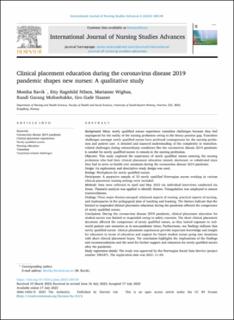| dc.contributor.author | Ravik, Monika | |
| dc.contributor.author | Nilsen, Etty Ragnhild | |
| dc.contributor.author | Wighus, Marianne | |
| dc.contributor.author | Mofossbakke, Randi Garang | |
| dc.contributor.author | Haanes, Gro Gade | |
| dc.date.accessioned | 2023-08-28T06:45:29Z | |
| dc.date.available | 2023-08-28T06:45:29Z | |
| dc.date.created | 2023-08-25T11:29:47Z | |
| dc.date.issued | 2023 | |
| dc.identifier.citation | Ravik, M., Nilsen, E. R., Wighus, M., Mofossbakke, R. G. & Haanes, G. G. (2023). Clinical placement education during the coronavirus disease 2019 pandemic shapes new nurses: A qualitative study. International Journal of Nursing Studies Advances, 5, Artikkel 100145. | en_US |
| dc.identifier.issn | 2666-142X | |
| dc.identifier.uri | https://hdl.handle.net/11250/3085902 | |
| dc.description.abstract | Background: Many newly qualified nurses experience transition challenges because they feel unprepared for the reality of the nursing profession owing to the theory-practice gap. Transition challenges amongst newly qualified nurses have profound consequences for the nursing profession and patient care. A detailed and nuanced understanding of the complexity in transition-related challenges during extraordinary conditions like the coronavirus disease 2019 pandemic is needed for newly qualified nurses to remain in the nursing profession.
Objective: This study explored the experience of newly qualified nurses entering the nursing profession who had their clinical placement education missed, shortened, or substituted since they had to serve as health care assistants during the coronavirus disease 2019 pandemic.
Design: An exploratory and descriptive study design was used.
Settings: Workplaces for newly qualified nurses.
Participants: A purposive sample of 10 newly qualified Norwegian nurses working in various clinical placement nursing settings were included.
Methods: Data were collected in April and May 2022 via individual interviews conducted via Zoom. Thematic analysis was applied to identify themes. Triangulation was employed to ensure trustworthiness.
Findings: Three major themes emerged: relational aspects of nursing, practical aspects of nursing, and inadequacies in the pedagogical plan of teaching and learning. The themes indicate that the limited or suspended clinical placement education during the pandemic affected the competence of newly qualified nurses.
Conclusions: During the coronavirus disease 2019 pandemic, clinical placement education for student nurses was limited or suspended owing to safety concerns. The short clinical placement durations affected the competence of newly qualified nurses, as they lacked exposure to real-world patient care scenarios as in non-pandemic times. Furthermore, our findings indicate that newly qualified nurses’ clinical placement experiences provide important knowledge and insight for educators in terms of education and support for future student nurses going into situations with short clinical placement hours. The conclusion highlights the implications of the findings and recommendations and the need for further support and education for newly qualified nurses after the pandemic. | en_US |
| dc.language.iso | eng | en_US |
| dc.rights | Navngivelse 4.0 Internasjonal | * |
| dc.rights.uri | http://creativecommons.org/licenses/by/4.0/deed.no | * |
| dc.title | Clinical placement education during the coronavirus disease 2019 pandemic shapes new nurses: A qualitative study | en_US |
| dc.type | Peer reviewed | en_US |
| dc.type | Journal article | en_US |
| dc.description.version | publishedVersion | en_US |
| dc.rights.holder | © 2023 The Author(s). | en_US |
| dc.source.volume | 5 | en_US |
| dc.source.journal | International Journal of Nursing Studies Advances (IJNS Advances) | en_US |
| dc.identifier.doi | https://doi.org/10.1016/j.ijnsa.2023.100145 | |
| dc.identifier.cristin | 2169604 | |
| dc.source.articlenumber | 100145 | en_US |
| cristin.ispublished | true | |
| cristin.fulltext | original | |
| cristin.qualitycode | 1 | |

